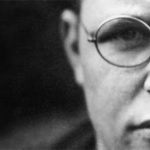The rich young ruler’s second fatal question: “Which ones?”
- Vorvort (Foreword): 1 2 3 4 5 6 7 8 9
- Inhaltverzeichnis (Table of contents) 10
- 1. Die Teure Gnade (1. Costly Grace) 11 12 13 14 15 16 17 18 19 20 21 22 23 24 25 26 27 28 29 30 31 32 33
- 2. Der Ruf in die Nachfolge (2. The Call to Discipleship) 34 35 36 37 38 39 40 41 42 43 44 45 46 47 48 49 50 51 52 53 54 55 56 57 58 59 60 61
Es folgt ein zweiter Fluchtversuch. Der Jüngling antwortet mit einer weiteren Frage: „Welche“? In dieser einen Frage steckt der Satan selbst. Hier war ja der einzig mögliche Ausweg für den, der sich gefangen sah.
A second escape attempt follows. The young man answers with a further question: “Which”? In this one question is Satan himself. Here was indeed the only possible way out for the one, who saw himself trapped.
Natürlich weiß der Jüngling die Gebote; aber wer will denn aus der Fülle der Gebote wissen, welches Gebot gerade ihm, gerade jetzt gilt? Die Offenbarung des Gebotes ist vieldeutig, ist unklar, sagt der Jüngling. Er sieht nicht die Gebote, sondern er sieht wiederum nur sich selbst, seine Probleme, seine Konflikte.
Of course the young man knows the commandments, but who wants to know from the fullness of the commandments, which command applies to him now? The revelation of the commands is ambiguous, is unclear, says the young man. He does not see the commandment, rather he sees in turn only himself, his problems, his conflicts.
Vom klaren Gebot Gottes zieht er sich zurück auf die interessante unbestreitbar menschliche Situation des „ethischen Konflikts“. Nicht dies ist daran falsch, daß er diesen Konflikt kennt, sondern daß dieser Konflikt ausgespielt wird gegen die Gebote Gottes. Vielmehr sind die Gebote gerade dazu gegeben, um den ethischen Konflikt zu Ende zu bringen.
From the clear commandment of God, he pulls himself back to the interesting undeniably human situation of “ethical conflict”. It is not wrong, that he knows this conflict; rather, that this conflict is played out against the commandments of God. Rather the commandments have precisely been given, to bring the ethical conflict to an end.



